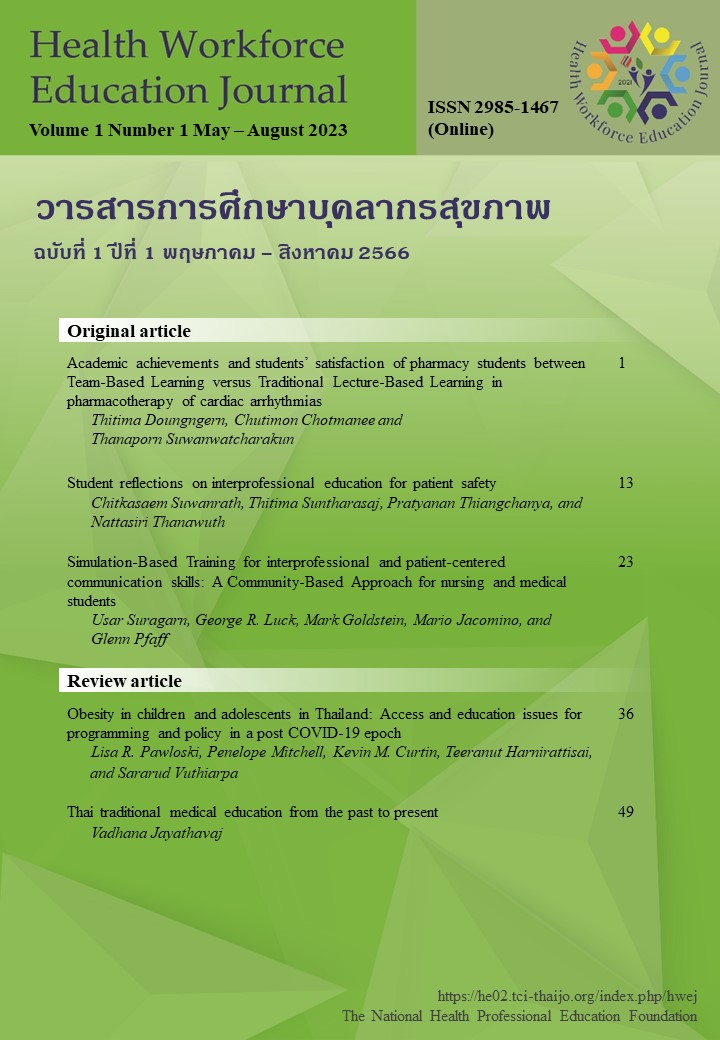Simulation-Based Training for interprofessional and patient-centered communication skills:
A Community-Based Approach for nursing and medical students
Keywords:
interprofessional, simulation, communication, patient-centered, collaborationAbstract
Educational institutions have a responsibility to produce a future healthcare workforce and prepare students to develop interprofessional competencies. This pilot study describes how a college of medicine responded to the need for interprofessional education by providing a simulation-based learning program available to medical and nursing students in the community as a routine part of their education. The simulation-based learning activities combined the Interprofessional Education Collaborative Core Competencies for professional communication practice and patient-centered communication skills. This simulation-based interprofessional learning program (Sim-ILP) consists of two sessions. The first session was a three-hour module designed specifically for nursing students to identify the differences in nurse-to-physician communication patterns and changes in the patient condition report. The second session was a four-hour module where nursing and medical students engaged with standardized patients in a primary-care setting, and human patient simulators in hospital settings. The comments from the program evaluation and the video-assisted verbal debriefing were positive. The medical students (n=16) and nursing students (n=16) learned how to develop a cooperative team effort across both professions, communicated shared decision-making plans of care with patients, and developed a collaborative care plan. The students recognized the importance of patient-centered communication to provide effective patient care, and the values of collaboration and shared decision-making by interprofessional teams. Simulation-based interprofessional learning program can be an effective strategy for shifting the way healthcare students communicate and collaborate to deliver patient-centered care to patients, families, and communities.
References
Institute of Medicine (US) Committee on Quality of Health Care in America. Crossing the Quality Chasm: A New Health System for the 21st Century. Washington (DC): National Academies Press (US); 2001. [cited 2021 Sept 13]. Available from: https://www.ncbi.nlm.nih.gov/books/NBK222274/ doi: 10.17226/1002
Haynes RB, McKibbon KA, Kanani R. Systematic review of randomised trials of interventions to assist patients to follow prescriptions for medications. Lancet. 1996 Aug 10;348(9024):383-6. doi: 10.1016/s0140-6736(96)01073-2. Erratum in: Lancet 1997 Apr 19;349(9059):1180. PMID: 8709739.
Shay LA, Lafata JE. Where is the evidence? A systematic review of shared decision making and patient outcomes. Med Decis Making. 2015 Jan;35(1):114-31. doi:10.1177/0272989X14551638. Epub 2014 Oct 28. PMID: 25351843; PMCID: PMC4270851.
Interprofessional Education Collaborative. Washington (DC): Core Competencies for Interprofessional Collaborative Practice 2016 Update. [cited 2021 Sept 13]. Available from: https://ipec.memberclicks.net/assets/2016-Update.pdf
Hall P. Interprofessional teamwork: professional cultures as barriers. J Interprof Care. 2005 May;19 Suppl 1:188-96. doi: 10.1080/13561820500081745. PMID: 16096155.
World Health Organization. Framework for action on interprofessional education & collaborative practice. [cited 2021 Sept 13]. Available from: https://apps.who.int/iris/handle/10665/70185
Baker C, Pulling C, McGraw R, Dagnone JD, Hopkins-Rosseel D, Medves J. Simulation in interprofessional education for patient-centred collaborative care. J Adv Nurs. 2008 Nov;64(4):372-9. doi: 10.1111/j.1365-2648.2008.04798.x. Epub 2008 Sep 1.
PMID: 18764851.
Chown G, Mader S, Eisenhauer R, Lichtenwalner J, Batz S. Interprofessional Education: Using Live Simulation to Enhance Collaboration and Communication. Health Interprof Pract Educ. 2015;2(3):eP1089. http://doi.org/10.7772/2159-1253.1089
Liaw SY, Zhou WT, Lau TC, Siau C, Chan SW. An interprofessional communication training using simulation to enhance safe care for a deteriorating patient. Nurse Educ Today. 2014 Feb;34(2):259-64. doi: 10.1016/j.nedt.2013.02.019. Epub 2013 Mar 19. PMID: 23518067.
Jacomino M, Bamdas JM, Keller K, Hamlin E, Hawkins M, Gordon S, Ouslander JG. An innovative interprofessional education program for university medical, nursing, and social work students learning in teams during sessions and visits with geriatric mentors. J Interprof Educ Pract. 2015;1:100-3. https://doi.org/10.1016/j.xjep.2015.10.003.
Kolb DA. Experiential learning: Experience as the source of learning and development, 2nd ed. Pearson FT Press/Upper Saddle River: New Jersey. 2015:31-61.
Brett-Fleegler M, Rudolph J, Eppich W, Monuteaux M, Fleegler E, Cheng A, Simon R. Debriefing assessment for simulation in healthcare: development and psychometric properties. Simul Healthc. 2012 Oct;7(5):288-94. doi: 10.1097/SIH.0b013e3182620228. PMID: 22902606.
INACSL Standards Committee. INACSL standards of best practice: SimulationSM Debriefing. Clin Simul Nurs. 2016;12:S21-S25. https://www.nursingsimulation.org/action/showPdf?pii=S1876-1399%2816%2930129-3
Chronister C, Brown D. Comparison of simulation debriefing methods. Clin Simul Nurs. 2012;8:281-8. https://doi.org/10.1016/j.ecns.2010.12.005
Grant JS, Moss J, Epps C, Watts P. Using video-facilitated feedback to improve student performance following high-fidelity simulation. Clin Simul Nurs. 2010;6(5),e177-84. https://doi.org/10.1016/j.ecns.2009.09.001

Downloads
Published
How to Cite
Issue
Section
License
Copyright (c) 2023 Health Workforce Education Journal

This work is licensed under a Creative Commons Attribution-NonCommercial-NoDerivatives 4.0 International License.
Authors must also attest that the manuscript is previously unpublished, not currently under consideration elsewhere and will not be submitted for publication elsewhere regardless of language and is submitted only to the Journal. Manuscripts under multiple publication policy are exempt from the said practice. Articles published in the Health Workforce Education Journal are copyrighted. No part of the articles may be copied, modified, reproduced or utilized in any form for any purposes without permission from the Journal. If excerpts from other copyrighted works are included, the Author(s) must obtain written permission from the copyright owners and credit the source(s) in the manuscript. All statements in, or omissions from, published manuscripts are the responsibility of the Authors, who will assist the editors by reviewing proofs before publication. The contents and opinions presented in the articles published in Health Workforce Education Journal do not reflect the opinion shared by the Journalûs editorial board.


